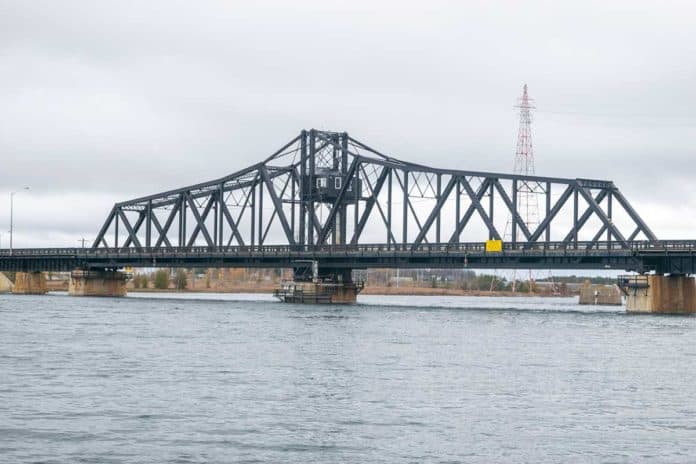GORE BAY—A Gore Bay town official says the Attorney General of Ontario, Doug Downey, recognizes the difficulties small Northern Ontario municipalities are having with the lack of revenues being derived by the Provincial Offences Act (POA). The Manitoulin POA has been in a deficit position every year since 2017.
“Attorney General Downey recognizes the capacity of the smaller municipalities is not the same as the big areas, and he recognizes for those in the North there is an issue,” stated Harry Schlange, Gore Bay town manager after he and Bryan Barker, mayor of Billings Township, Danny Whalen, president of the Federation of Northern Ontario Municipalities (FONOM), and Mark Wilson, a Zone 9 Rural Ontario Municipal Association board director met with Mr. Downey at the Association of Municipalities of Ontario (AMO) conference in Ottawa last week.
“The town does the administrative work for the Island municipalities for POA,” said Mr. Schlange. “When the province downloaded POA onto municipalities in 2000 one of the commitments they made was that it would be a net revenue generator and would promote justice. But since 2017 our POA has seen deficits every year,” which as pointed out is shared, as they were in years there were revenues, among all Island municipalities. “Small municipalities don’t have the staff to prosecute POA cases and have to bring in third party lawyers (prosecutors) outside the corporation to carry out this work.”
“The commitment that the province made that POA would be a net revenue generator is no longer meeting that commitment,” said Mr. Schlange.
In the first year of the POA being set up, the operating revenues to Manitoulin POA was $53,453.45 but since 2017 there has been a deficit in the operational costs including $15,000 in 2023 and an estimated deficit of $28,941 in 2024 for the Island POA. When the POA was first being downloaded to the municipalities it was touted as a revenue source, but the revenue never lived up to that claim. In part, this was due to the rising tendencies for those facing traffic tickets opting to challenge the tickets. The cost associated with providing for those challenges usually outweighed the revenue from the ticket.
Added to the mix are a number of other financial challenges facing the POA. One is that the POA rarely receives any monetary award from a prosecuted fine from a provincial offence such as those involving the Ministry of Natural Resources and Forestry. This despite the huge costs associated in prosecuting those charges, which can often run to days of court time.
Another reason is that during COVID a number of additional costs were added to the operation of the courts, many specifically related to remote attendance-with the POA covering these costs including courtroom renovations needed to protect those attending court, the additional staff required due to operating the remote software and monitoring the remote attendees.
The delegation provided case studies for Temiskaming Shores POA, Espanola POA and Gore Bay POA. “The most recent example of one very costly part III special trial consisted an MNR matter before the court regarding a charge related to aggregate resources. This trial began in December 2022 and was completed in March 2024. There were 12 court dates and in the end the case was dismissed, and charges were withdrawn.”
“The financial implications of this one trial resulted in $11,000 in adjudication costs for the Justice of the Peace, alongside 45 person-days of our staff’s time,” the delegation continued, relating the case for Gore Bay. “Our office is very small and at the time of the trial we did not have additional court staff to assist with running the virtual portion that was necessary for the trial, so we needed to pull a member of the town staff from their duties to ensure the technology was running smoothly during the proceedings.”
“Thankfully, Gore Bay is not part of the Part III pilot, which requires the municipal prosecutor to proceed with the prosecution rather than the Crown. In the example above there was an MNR prosecutor involved so there were no costs associated with the prosecution. However, if this were a matter before the court that our municipal prosecutor was to be involved in the costs would have been exponentially higher. Not to mention even if we were paying for Crown prosecution, we only pay for their court time, not the time that is spent in the background preparing for the case and working with defendants.”
The delegation continued, “The City of Temiskaming Shores and municipalities under the current agreement are concerned about the sustainability of operation at the termination date of the interim transfer agreement and therefore was on the ministry of the Attorney General to conduct an evaluation of the operations of provincial offences courts to ensure operations are fiscally sustainable and with fair access to justice service for a strong, reliable system.”
When the transfer of responsibility took place over 25 years ago, it was on the basis of being cost recovery and revenue positive. Primary factors affecting revenues are: prosecution costs, court delays and backlog, charges and fines withdrawn.
The transfer of PART III and IX matters of the POA prosecuted by the criminal law division of the Ministry of the Attorney General to municipalities in 2022 led to a notable escalation in prosecution costs rising. This substantial increase can be attributed to the extended time spent by municipal prosecutors in processing these matters for resolution or trial. Despite these efforts, the resulting expenses were not adequately offset by fines collected.
“Small POA municipal service providers in the Northern region have indicated similar challenges in rising costs and deficits of operation, indicating they are not favourable to assuming the transfer of Part II and IX matters of the POA prosecuted by the Criminal Law Division of the Ministry of the Attorney General to municipalities.”
The delegation noted, “Criminal courts continue to have priority over provincial offenses court in scheduling judicial resources, resulting in backlog and an increase in withdrawn charges. Administration of the framework is done, with great difficulty of collecting fines or control over the outcome of the charges. We understand the provincial total of unpaid fines is estimated to be approximately $1.7 billion.”
Mr. Schlange added, “Our delegation requested a service review of the POA for municipalities in the North. Secondly, we are asking that the province fund the deficit. If there is a deficit in POA operation at the end of the year we want that to be funded. The real work starts now as we and the ministry will be following up on the issues that were raised.”





